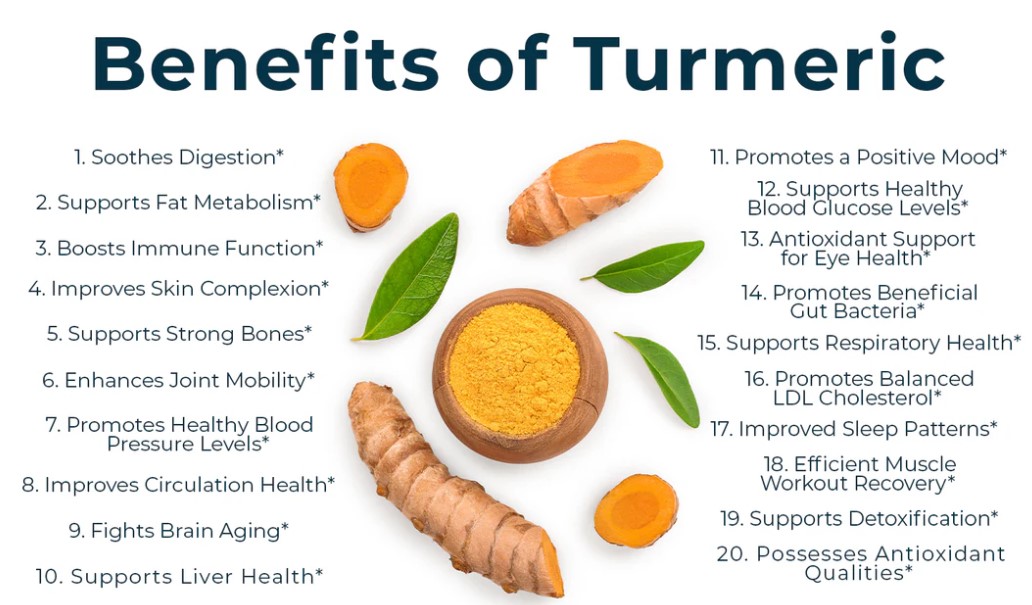BOURSESSENEGAL – Turmeric benefits have gained significant attention in recent years, and for good reason. This golden spice, widely used in cooking, especially in Indian cuisine, offers a wealth of health advantages. Packed with curcumin, its active compound, turmeric has anti-inflammatory, antioxidant, and potential healing properties. In this guide, we will delve deep into the many benefits of turmeric, explore how to incorporate it into your diet, and discuss any precautions you should take.
What is Turmeric?
A Brief Overview
Turmeric, scientifically known as Curcuma longa, belongs to the ginger family. It’s known for its vibrant yellow color and distinct flavor. Traditionally, it has been used in Ayurvedic medicine for centuries, and now its popularity is spreading worldwide due to its health benefits.
The Active Ingredient: Curcumin
Curcumin is the main active ingredient in turmeric. It is what gives turmeric its yellow color and is responsible for many of its medicinal properties. However, curcumin is not easily absorbed by the body, which is why combining turmeric with certain foods can enhance its effectiveness.
Health Benefits of Turmeric
1. Powerful Anti-Inflammatory Effects
One of the most well-known turmeric benefits is its ability to combat inflammation. Chronic inflammation contributes to many diseases, including heart disease, cancer, and Alzheimer’s. Studies show that curcumin can help reduce inflammation by inhibiting inflammatory molecules in the body.
2. Antioxidant Properties
Turmeric is rich in antioxidants, which help neutralize free radicals in the body. These free radicals can cause oxidative stress, leading to cell damage. Curcumin enhances the activity of antioxidant enzymes, boosting your body’s defenses against oxidative stress. This can promote overall health and well-being.
3. Supports Joint Health
If you suffer from joint pain or arthritis, turmeric may be a game-changer. Research indicates that curcumin can help alleviate symptoms of joint pain and improve function. Its anti-inflammatory properties reduce swelling and discomfort, making it a natural alternative to traditional pain relief methods.
4. Aids Digestion
Turmeric benefits your digestive system as well. It can stimulate bile production, which is essential for fat digestion. Additionally, its anti-inflammatory properties may help soothe the gut lining, making it beneficial for those with digestive disorders such as irritable bowel syndrome (IBS).
5. Enhances Brain Function
Curcumin has been linked to improved brain function. It may increase levels of brain-derived neurotrophic factor (BDNF), a protein that supports neuron growth and function. Higher BDNF levels are associated with improved memory and a lower risk of neurodegenerative diseases.
6. May Help Lower Risk of Heart Disease
Heart disease remains a leading cause of death worldwide. Turmeric can play a role in heart health by improving the function of the endothelium, the lining of blood vessels. This helps regulate blood pressure and reduces the risk of heart disease.
7. Potential Anti-Cancer Properties
Research suggests that curcumin may have anti-cancer properties. It can affect cancer growth, development, and spread at the molecular level. Some studies indicate that curcumin may even help prevent cancer from occurring in the first place.
8. Supports Immune Function
Turmeric may enhance your immune system. Its anti-inflammatory and antioxidant properties can help the body fight off infections and illnesses. Including turmeric in your diet can provide an extra boost to your immune response.
How to Incorporate Turmeric into Your Diet
1. Turmeric Tea
One of the easiest ways to enjoy turmeric benefits is by making turmeric tea. Simply boil water, add a teaspoon of turmeric, and let it steep. You can enhance the flavor with honey and lemon, or add ginger for an extra kick.
2. Golden Milk
Golden milk is a popular drink made from turmeric, milk (or a milk alternative), and spices like cinnamon and black pepper. The black pepper enhances curcumin absorption, making it a delicious and nutritious option.
3. Add to Smoothies
Blend turmeric into your morning smoothie. Pair it with fruits like bananas or mangoes, along with spinach or kale for an antioxidant boost.
4. Cooking with Turmeric
Incorporate turmeric into your meals. Add it to curries, rice dishes, soups, or roasted vegetables. Its unique flavor complements a variety of dishes, making it a versatile spice.
5. Turmeric Supplements
If you’re looking for a more concentrated source, consider turmeric supplements. However, always consult with a healthcare professional before starting any new supplement regimen.
Precautions and Considerations
Who Should Avoid Turmeric?
While turmeric is generally safe for most people, certain individuals may need to exercise caution. If you’re pregnant, nursing, or have specific health conditions, consult your doctor before increasing turmeric intake. High doses of turmeric can lead to digestive issues or interfere with certain medications, especially blood thinners.
Dosage Recommendations
There’s no established standard dosage for turmeric or curcumin. However, many studies use doses ranging from 500 mg to 2000 mg of curcumin per day. If you decide to take supplements, follow the recommended guidelines on the product label.
Conclusion: Embrace the Turmeric Benefits
Incorporating turmeric benefits into your daily routine can lead to significant health improvements. From its anti-inflammatory properties to its potential cancer-fighting capabilities, turmeric is a powerful ally for your health. Whether you enjoy it in tea, smoothies, or meals, finding ways to include this golden spice in your diet is essential.
Don’t forget to combine turmeric with black pepper to enhance absorption and maximize its benefits. As with any health regimen, it’s wise to consult with healthcare professionals, especially if you have existing health conditions or take medications. By embracing the power of turmeric, you take a step towards a healthier, more vibrant life!
REFERENCE : https://www.cdcfoundation.org/



